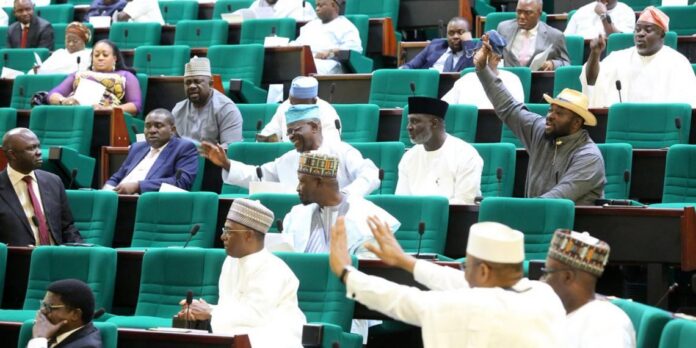Educating children abroad is a fundamental right, the lawmakers argue while shooting down the bill sponsored by Sergius Ogun
By Ishaya Ibrahim, News Editor
The House of Representatives today rejected a bill that seeks to ban public office holders from sending their children and wards to be educated abroad.
The bill, sponsored by Sergius Ogun, a lawmaker representing Esan North/East Federal Constituency of Edo State on the platform of the Peoples Democratic Party (PDP) aims to strengthen educational institutions in Nigeria by banning elected officials from sending their children abroad while leaving the country’s education to rot.
TheNiche had in 2019, reported how public officials prefer sending their children to choicest universities abroad while those who could not afford the luxury, endure frequent disruptions in their children’s education due to strikes by the Academic Staff Union of Universities (ASUU).

TheNiche report recalled that in 2016, Aljazeera’s Dennis Martine asked President Muhammadu Buhari why his children were schooling abroad and not in Nigerian Universities. Buhari responded: “Because I can afford it.”
RELATED
Alarming trend of how Nigerian leaders kill education by sending wards abroad
Like Buhari, many other Nigerian officeholders who send their children to be educated abroad included; Vice President Yemi Osinbajo, then-Senate President Bukola Saraki, his deputy Ike Ekweremadu, PDP presidential candidate in the 2019 election, Atiku Abubakar, and many others.
But Ogun argued that banning children of public office holders from sending their children abroad to be educated would strengthen the sector.
The bill is titled “A Bill for an Act to Regulate International Studies for Wards and Children of Nigerians Public Officers, So as to Strengthen Indigenous Institutions to Provide Efficient Educational Service for National Development.”

Ogun, in laying down the general principle of the bill, said it included strengthening indigenous educational institutions to meet global standards; boosting the economy by reducing cash flight and foreign exchange; reducing brain drain and instituting good welfare conditions for indigenous academics, experts and professionals based abroad to come back home and develop their country with their skills and expertise; building a better society by developing formidable educational institutions and facilitating the realization of the fundamental objectives and policies of state enshrined in Chapter two of the Constitution of the Federal Republic of Nigeria, 1999 (As Amended).
He said: “The bill does not prevent public officers or private citizens from sending their children/wards for studies abroad, it only seeks to ensure that a public officer who desires to send his/her child/ward abroad, does not divert public funds to so do. Thus, such a public servant must first show that he/she has the legitimate means to sponsor his/her child/ward on such foreign education trips.
“The bill will help in fostering the development of our educational institutions as it will instil accountability and seriousness into public servants at all levels who are saddled with the responsibility of implementing the policies and programmes of government.
“The bill when enacted will help to redirect the huge funds that fly out to other countries, into the relevant sectors of our economy. It will bring about better facilities in our national life.

“This bill when passed into law will engender the actualization of the provisions of the United Nations Convention against Corruption, to which Nigeria is a party. Article 5 of the Convention provides that; “Each State Party shall, in accordance with the fundamental principles of its legal system, develop and implement or maintain effective, coordinated anti-corruption policies that promote the participation of society and reflect the principles of the rule of law, proper management of public affairs and public property, integrity, transparency and accountability.
“This bill when passed into law will foster the realization of the directive principle of state policy contained in chapter two of the Constitution which provides that;
“(1) Government shall direct its policy towards ensuring that there are equal and adequate educational opportunities at all levels. (2) Government shall promote science and technology (3) Government shall strive to eradicate illiteracy; and to this end Government shall as and when practicable provide:
(a) free, compulsory and universal primary education; (b) free secondary education; (c) free university education; and (d) free adult literacy programme”.
“This bill does not infringe on the right to family and private life as well as other fundamental rights enshrined in the Constitution. The bill only seeks to regulate the practice of public servants sending their children/wards abroad for studies, while neglecting the development of our indigenous educational institutions.
“The fact that there is no similar legislation in other jurisdictions does not obviate us (Lawmakers) of the duty to make laws to address peculiar challenges that bedevil us as a nation and correct ills when they exist, as required of us, by section 88(2) of the Constitution (Supra). For instance, the Republic of China introduced the ‘one-child birth’ policy in late 1970, so as to reduce the massive growth rate in China’s population, which the Chinese government thought to be too high. The policy helped to cut down the population.
“In a report credited to the Chinese government, it was stated that an estimated 400 million births were prevented by the policy. This bill is an example of such drastic policies required to tackle national problems. Also, the absence of similar legislation in other climes, only shows that they have built their educational institutions to a point of global admiration and have thus become educational tourism destinations for underdeveloped nations.

“Mr Speaker, Honourable Colleagues, as I speak now, students of Nigerian Universities are sitting at home doing nothing, due to the strike action embarked upon by the Academic Staff Union of Universities (ASUU), in protest against poor remuneration, poor infrastructure and poor conditions of service, under-funding of universities, delay in the payment of the elongated salary structure amongst others. These and other sundry issues will be addressed when this bill is passed into law and its provisions properly implemented. We may not be able to quantify the worth of quality education in terms of its impact on the individual, family and nation. But there is no gainsaying the fact that without quality education, a nation has no future.”
But the majority of the lawmakers said the bill was going to violate their rights to educate their children wherever they want.
But speaking against the bill, some lawmakers said they had the right to train their children anywhere without using public funds.
According to Vanguard Newspaper, one of the lawmakers was Hon. Chinyere Igwe (PDP, Rivers).
He said: “It offends fundamental human rights which guarantees freedom of movement. Most public officers that send their children to school abroad don’t do that with public funds. I also don’t agree that is the reason the educational system in Nigeria is failing. I urge him to withdraw the Bill”.
Corroborating Igwe’s position, Hon. Ossai Nicholas Ossai (PDP, Delta), said it was against the constitution.
“It’s against the constitution in terms of discrimination. My children have the right to be educated anywhere in the world. The bill should not see the light of the day. He should just step it down,” he said.
The bill when put to voice was killed by the majority of the House members who shouted no to its passage for second reading.







